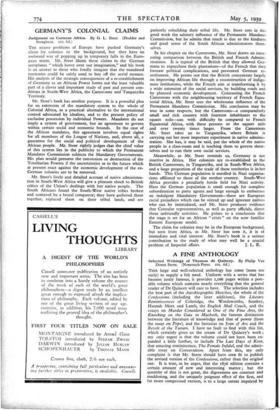GERMANY'S COLONIAL CLAIMS
THE nearer problems of Europe have pushed Germany's claim for colonies to the background, but they have an awkward way of popping up in temporary lulls in the Euro- pean storm. Mr. Steer likens these claims to the German aeroplanes " which hover over our imagination," and his book is an answer to those who fondly imagine that the mandated territories could be safely used to buy off the aerial menace. His analysis of the strategic consequences of a re-establishment of Germany as an African Power forms not the least valuable part of a clever and important study of past and present con- ditions in South-West Africa, the Cameroons and Tanganyika Territory.
Mr. Steer's book has another purpose. It is a powerful plea for an extension of the mandatory system to the whole of Colonial Africa, as a practical alternative to the international control advocated by idealists, and to the present policy of exclusive possession by individual Powers. Mandates do not imply a system of government, but an agreement to govern within certain social and economic bounds. In the case of the African mandates, this agreement involves equal rights for all members of the League of Nations, and, above all, a guarantee for the social and political development of the African people. Mr. Steer rightly judges that the chief value of this system lies in the publicity to which the Permanent Mandates Commission subjects the Mandatory Governments. His plan would presume the conversion or destruction of the Totalitarian Powers if the uncertainties as to the future which at present react against the economic development of the ex- German colonies are to be removed.
Mr. Steer's lively and detailed account of native administra- tion in South-West Africa will give a pleasant shock to British critics of the Union's dealings with her native people. The South Africans found the South-West native tribes broken and scattered by a brutal conqueror; they have gathered them together, replaced them on their tribal lands, and are patiently rebuilding their tribal life. Mr. Steer sees in this good work the salutary influence of the Permanent Mandates Commission, but he admits that much is due to the kindness and good sense of the South African administrators them- selves.
In his chapter on the Cameroons, Mr. Steer draws an inter- esting comparison between the British and French Admini- strations. It is typical of the British that they allowed Ger- mans to repurchase their plantations—of the French that they foresaw political complications, and prevented German re- settlement. He points out that the British concentrate largely on improving African life through a reconstruction of indige- nous institutions, while the French aim at transforming it by a wide extension of the social services, by building roads and by planned economic development. Contrasting the French Cameroons with the neighbouring territory of French Equa- torial Africa, Mr. Steer sees the wholesome influence of the Permanent Mandates Commission. His conclusion may be true in some respects, but the Cameroons—a comparatively small and rich country with fourteen inhabitants to the square mile—can with difficulty be compared to French Equatorial Africa, with three persons to the square mile and over twenty times larger. From the Cameroon Mr. Steer takes us to Tanganyika, where Britain is carrying out her most important experiment in native adminis- tration. She has, it may be said, put the whole of the native people in a class-room and is teaching them to govern them- selves and to run their own social services.
Meanwhile, as Mr. Steer reminds us, Germany is not inactive in Africa. Her colonists are re-established in the British Cameroons, in Tanganyika, and in South-West Africa, and a large proportion of the trade of these territories is in her hands. This German population is enrolled in Nazi organisa- tions affiliated to those of the mother country. South-West Africa provides a peculiarly fertile field for Nazi activity. Here the German population is small enough for complete subordination to party agents and large enough to embarrass an indulgent Mandatory Government—there are European racial prejudices which can be stirred up and ignorant natives who can be intimidated, and Mr. Steer produces evidence that Consular representatives, as well as party officials, direct these unfriendly activities. He points to a conclusion that the stage is set for an African " crisis " on the now familiar Eastern European model.
The claim for colonies may be in the European background, but seen from Africa, as Mr. Steer has seen it, it is of immediate and vital interest. Mr. Steer's book is a serious contribution to the study of what may well be a crucial














































 Previous page
Previous page